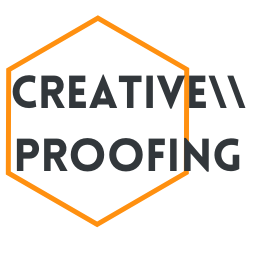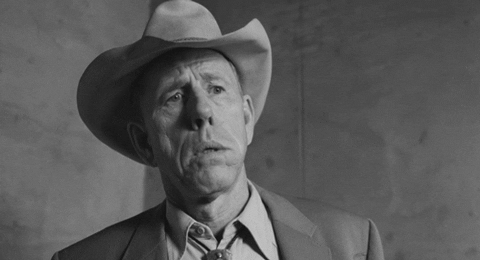I'm Megan J. Robinson, and this is Creative\\Proofing, a space to think, feel, and design out loud. Every Thursday I'll send you a newsletter exploring the intersection of creativity, spirituality, and productivity, and what that looks like for each of us. In each issue of Creative\\Proofing, I’ll dig into various questions, ideas, and topics by sharing what other thinkers, feelers, and doers have said, followed by my take, and then, what it do and what it mean for us going forward. I’ll also try to throw in reader feedback, recommendations, and maybe something I’m enjoying that week. I can't wait for you to join me.
This newsletter is currently ad-free, and just free. (If that changes in the future, I'll be sure to let you know.) You can reach me anytime by replying to this email, and if someone sent this to you, they may be asking you to sign up as well. You can do that by clicking here.
If you'd like to listen, you can also subscribe to the Creative\\Proofing podcast.
This week, let's reflect on what we've explored so far, and what it might mean for us going forward. In previous issues of Creative\\Proofing, we looked at aspects of human being through lenses such as the Enneagram, creativity, and productivity. We've explored the history of creativity in Western culture, and how neuroscience sheds light on our imaginative capacities. We've touched on what it might look like draw from our hearts, heads, and hands as equally valid sources of knowing, and started to notice what exactly is it that we love and give our attention and time to. And we've also considered what it might mean to alter, adapt, or otherwise behave differently in light of what we discover about ourselves in these explorations.
To what results or changes could we point in our lives that might show growth or transformation? What would demonstrate that we've gained new insights or skills in our journey through life? I suggest that we signal such growth as we become more true, more resilient, and more expressive.
Let's unpack this together.
A Quick Note
I work from within the Christian tradition, and understand the Divine as the Trinity of father, son, holy spirit. That said, I know we all have different ways of understanding the Divine, so if you wish to insert [Other] when I use that phrase, please feel free to do so.
What does it mean to become more true? There's a phrase often used to describe something misaligned or incorrectly formed, and that's to say that the thing is "out of true." When we adjust a crooked picture on its nail, or cuss when a bike chain slips gears, we signal awareness that the picture or chain has an optimal, true alignment that isn't occurring at the moment. We can also say the same thing about ourselves, and recognize that sometimes we, too, can live "out of true" to what we hope for, or believe, in our lives.
I don't think it's too much of a stretch to say that we all hold deep longings within ourselves: for significance, for connection, for belonging. We each, in our various ways, seek opportunities to connect and belong to communities, causes, and goals. In doing so, we accumulate ideas, behaviors, and perspectives that slowly develop into identities that we accept or reject. Have you ever walked into a gathering, and been immediately recognized and welcomed by others already there? It's the best feeling in the world, to know you are wanted and enjoyed for simply showing up. But sometimes, you may have the suspicion that the person welcomed to the party is not necessarily the person you really are. Or perhaps you wonder if you even know who you truly are.
Sometimes the accumulations of our lives obscure or actively distort our true selves, and it takes some hard work to admit that we've been living "out of true" for a long while. It can also mean teasing out the differences between what's genuinely true, and what the world around you has told you is true. Doing that work can mean listening to the call of the Divine in our lives, asking who we want to be, and where we want to go, and taking seriously the answers that lead us to new journeys. Becoming more true can look like greater coherence between our inner and outer selves, no longer feeling the need to hide or redirect who we recognize ourselves to be.
But the journey to trueness takes us through some difficult and uncomfortable places, when we no longer recognize our previous identity, but we haven't yet arrived at our truer self. This liminal stage of the journey can be disorienting, even frightening, and requires developing new behaviors, new skills. Becoming more true requires us to also become more resilient, capable of meeting the unfamiliar with anticipation and wonder, rather than with fear or confusion. Resilience encompasses several postures or attitudes: of flexibility, bending in response to pressures rather than fracturing or breaking; of hope, reminding ourselves that who we are is not who we have to be; and of curiosity, holding an interest in what's next and a willingness to explore what we encounter. Building resilience takes time and practice: recognizing that we will encounter disappointments and obstacles in our days, but — and this is key — taking each occurrence as an opportunity to remind ourselves that obstacles and disappointments are simply a plot point: they are not the whole story of our lives.
And just as the call to become more true can launch us into a journey that builds our resilience, it's that very resilience that helps us distinguish our true self from our false self. The practice of flexibility, hope, and curiosity becomes a mirror to which we hold up the various constructed identities we've accumulated and ask, "is this really me? do I really want to be this person?" And as you answer yes to one, and no to another, you begin to reorient your sense of true, to perceive the paths of your journey that lead to the connections, significance, and belonging you've sought throughout your life. Resilience helps you stay on that journey, both hoping and trusting that you will one day arrive as the person who is beautifully, truly you.
If resilience helps you stay on the path and keep the plot of your story, it's also what gives you a story to tell at all. Have you ever noticed that stories come from the in-between spaces, when we're moving from one thing to another? You get to decide if that journey towards your true, resilient self becomes a comedy or a tragedy simply in how you tell the story. It's in the telling that we learn what all the obstacles, diversions, and discoveries actually meant, and it's in the sharing of the story with others that we discern who we've become, by how others share the experience with us. The final signal of our growth in trueness and resilience lies in becoming more expressive: in making something something tangible and discernible that we can interact with, and make sense of together. In telling our stories through conversation, song, writing, dance, food, video, or anything that we can use to make something out of the world around us, we make connection with others possible. Expressing who we've become and what we've learned makes space for others to enter, to belong in a similar journey. Expressing what we hope to discover clarifies what we've learned, what we truly understand and value, and where we hope to go, and someday, to arrive.
In thinking through what it might look like to become more true, resilient, and expressive, I feel I've been walking through my own story. For years, I felt like I tried on multiple identities and personality traits, pulling from this friend and that conversation to build a composite character that walked like a real girl and sometimes talked like one too. I never trusted that the person I glimpsed between the cracks was genuine or appealing, or even worth paying attention to. Some of that resolved itself just by growing up, and some of those composites simply fell apart when I learned I had cancer at 29 years old. You learn very quickly what you no longer want to carry around with you in such moments.
Becoming more true in the years since has looked a lot like resilience, actually: showing up every morning and expecting to make something of my life that didn't exist the day before. Some days, it sucks donkey balls. And some days, when I'm telling a friend how much it sucked and how broken apart and out of true I feel, I realize how far I've actually traveled, and how true I've become in the traveling. And those are the days I remember that far more can be mended than I know. The truest thing I know to say is that I live, and travel, in hope.
What's your true?
Creative\\Responses
Got a question, feedback, or something to share? All you have to do is reply to this email and write me! (Be sure to let me know if you want to remain anonymous, or if it's ok to use your first name.)
Creative\\Recommendation
Currently reading Hench, by Natalie Zina Walschots, and it is, in the words of one reviewer, "furious, compelling, and angry as hell." Can't disagree.
Creative\\Enjoyment
Tell your friends.
If you’d like to support Creative\\Proofing, the best thing to do is spread the word. If you think of five friends who might enjoy this, forward this email to them! Degrees of gratitude may vary, but please know, my gratitude is infinite.
You can share Creative\\Proofing on all the socials.
Shalom!





